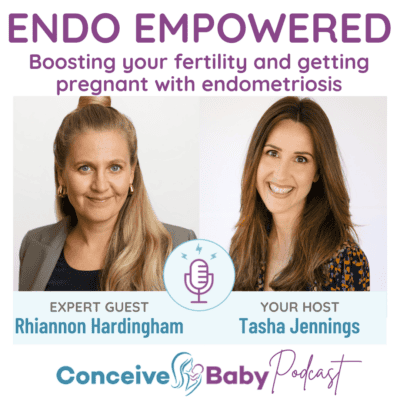
In this episode of the Conceive Baby podcast, my wonderful colleague, fellow Fertility Naturopath Rhiannon Hardingham joins me to discuss the unique challenges and solutions involved in managing endometriosis and creating a healthy pregnancy.
Endometriosis is common yet often misunderstood condition that impacts millions of women, yet diagnosis can take an average of 7 years or more, with considerable suffering in between.
We dive into the complex nature of endometriosis, and explore how this condition extends far beyond its diagnosis of ‘misplaced endometrial tissue’. With a focus on practical resolutions, we unpack the underlying drivers including immune dysregulation, inflammation, and the intertwining of genetics and microbiome health and draw a clear picture of what you can do to reduce symptoms, improve fertility, and increase your chances of conceiving a healthy baby.
Expert Guest – Rhiannon Hardingham is a renowned naturopath, presenter, practitioner, educator, mentor, and author with over 16 years of experience specialising in infertility and IVF support. She has made significant strides in the integration of natural and conventional medicine, often working alongside top fertility doctors in Melbourne to achieve the best outcomes for patients. Rhiannon is a respected voice in her field, routinely invited to present on collaborative patient care to medical specialists and naturopaths. She also fulfils her passion for education by providing professional mentoring to functional medicine practitioners. Authorship is among her achievements; co-authoring “Create a Fertile Life,” a preconception healthcare guide, stands as a testament to her commitment and expertise in fertility health.
Website: https://www.rhreproductivehealth.com/
Instagram: https://www.instagram.com/rhihardingham/
- Endometriosis is more than just tissue growth outside the uterus; it involves immune dysregulation and microbiome dysbiosis, making it a multifactorial condition.
- Diagnostic strategies for endometriosis include ultrasound, laparoscopy, CA-125 blood tests, and there is an emerging role for MRI assessments.
- Diet and lifestyle modifications, such as consuming high-fibre foods and omega-3-rich fish, avoiding processed foods, and engaging in regular exercise, can have significant impacts on managing endometriosis.
- The microbiome plays a pivotal role in the regulation of inflammation and immunity; specific probiotic strains like Lactobacillus rhamnosus, reuteri, and crispatus are beneficial for uterine health.
- Individualised approaches in treatment, testing, and supplementation, including considerations for hormone clearance pathways, are critical for optimal outcomes in managing endometriosis and fertility challenges.
